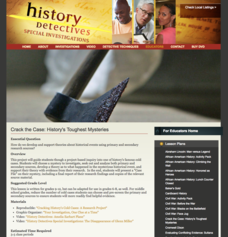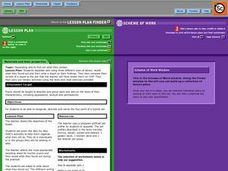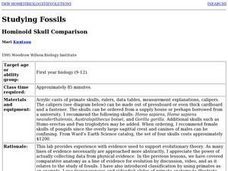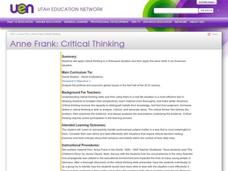PBS
Crack the Case: History's Toughest Mysteries
Young sleuths don their trench coats, tip their fedoras, and grab their notepads to investigate one of four famous unsolved mysteries. After examining multiple primary and secondary sources related to their cold case, they propose a...
Have Fun Teaching
Identifying Author's Purpose
The multi-lesson, 47-page packet contains everything you need to ensure kids can recognize the clues provided to identify the type of text, the intended audience, and the author's purpose in writing the passage.
Scholastic
Recovery From Drug Addiction
Are there factors that put some individuals at a higher risk for drug addiction than others? Learn more about the risk factors that may make some people more susceptible to addiction, as well as protective factors that help prevent...
Mr. Roughton
The Maya Files
Class members adopt the role of Law and Order history investigators and examine primary source documents to determine the legitimacy of Marco Polo's claim that he traveled to and traded in China. A cleverly crafted...
EngageNY
Listening Closely and Taking Notes: Colonial Trade Podcast About the Wheelwright
Voices from the past. Young scholars listen to a podcast interview with a historical re-enactor as they continue their research in the eleventh instructional activity of this unit on colonial trade. Applying their close reading skills,...
Historical Thinking Matters
Spanish-American War: 3 Day Lesson
Why did the United States choose to invade Cuba in 1898? As part of a 3-day lesson, your young historians will first develop working hypotheses to answer this question, then work with a variety of historical primary source documents that...
National Endowment for the Humanities
Courage “In the Time of the Butterflies”: A Common Core Exemplar
The courage of Las Mariposas, the Mirabal sisters, is the focus of a series of activities designed to accompany a reading of In the Time of the Butterflies that ask readers to consider what it means to be courageous. Beautifully crafted...
TED-Ed
The Fundamentals of Space-Time: Part 3
If you weren't already blown away by first two installments, check out this clip on how gravity and space-time interact! Our physicist friends, Pontzen and Whyntie, continue their discussion of these motion concepts for your high...
Mr. Roughton
CSI: Florence
Who done it? Class groups adopt the role of crime scene investigators and examine exhibits (primary source documents) to determine who attempted to assassinate the members of the Medici dynasty.
Madison Public Schools
Journalism
Whether you are teaching a newspaper unit in language arts, covering the First Amendment and censorship in social studies, or focusing on writing ethics in journalism, a unit based on the foundations of journalism would be an excellent...
American Chemical Society
Change in Temperature - Endothermic Reaction
Now that learners have been exposed to chemical changes, they learn that some take in heat and therefore, decrease in temperature. The same reaction that they have been investigating between baking soda and vinegar is revisited,...
Curated OER
The Shakespeare Crowd
Students study the life and times of Shakespeare. They read and analyze one of his plays and use the Internet and videos to gain an understanding of how Shakespeare engaged his audiences, then and still today.
Curated OER
How Accurate Is It?
Students examine how generalizations can easily be invalid. They qualify generalizations to make them accurate and challenge generalizations made about people, insist on knowing the evidence that supports these, and modify their own...
National Endowment for the Humanities
Family Voices In As I Lay Dying
Learners analyze William Faulkner's 'As I Lay Dying' and his use of multiple voices. In this William Faulkner lesson plan, students analyze Faulkner's use of multiple voices in narration. Learners examine the Bundren family through the...
Curated OER
Materials And Their Properties
Seventh graders investigate the particulate level of solids, liquids, and gases. They examine how the particle method show the interplay between scientific theories and evidence.
Curated OER
America's Favorite Landmarks
Young scholars research using Google Earth a variety of websites to explore America's most prominent and famous buildings. They then compare and contrast architectural styles and write a position paper defending or arguing against their...
Curated OER
Global Warming: Life in a Greenhouse
Students examine the evidence that scientists have used to support the existence of global warming and the greenhouse effect. How the concepts have been developed and evaluated form the focus of this instructional activity.
Curated OER
A Christmas Carol - Charles Dickens
Students study and explore the portrayal and development of a major character in a novel from the novel, "A Christmas Carol," by Charles Dickens. They identify words and phrases that effectively describe the main character in this novel....
Curated OER
Studying Fossils: Hominoid Skull Comparison
Learners collect data on the differences in Hominid skulls using acrylic casts of fossil skulls. They measure a series of structures on skulls from six different species then use the data to determine evolutionary relationships between...
Curated OER
Integrating Technology: Seeing Atoms: STM
In this atom worksheet, students learn about the scanning tunneling microscope and answer questions about its use, how it works and its ability to see electrons in atoms.
Curated OER
Ziplock Chemistry
Learners investigate various chemical reactions when creating mixtures in ziplock baggies. In this chemistry lesson, students will recognize various chemical reactions and cite evidence. Safety and assessment strategies are included in...
Curated OER
Juvenile Offenders
Learners investigate how different democracies treat juvenile offenders as well as compare/contrast the juvenile and adult justice systems in their own democracy. In addition, individually and as a group, they determine whether juvenile...
Curated OER
Walking on Thin Ice
Students examine scientific evidence of changes in the Arctic ice cover. They participate in a simulation of an international conference and debate the relationship between global warming and changes in the arctic ice cover.
Curated OER
Anne Frank: Critical Thinking
Students read a story by James Clavell about propaganda and they discuss how it was used in the story. In groups, they decide what they would do if faced with certain situations.

























